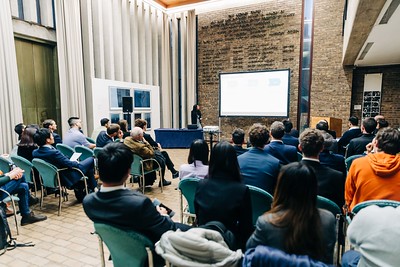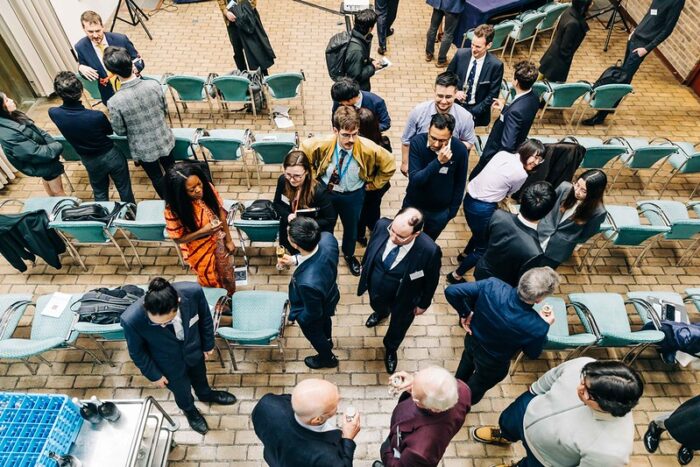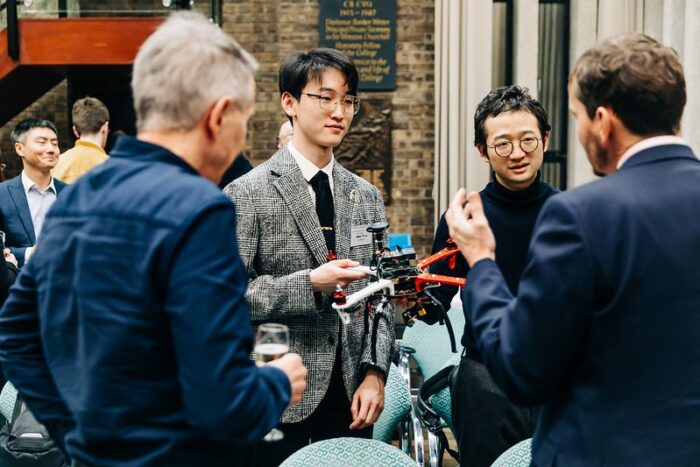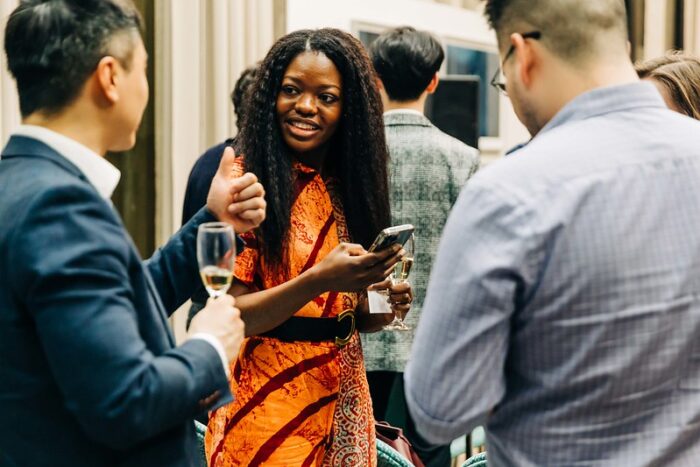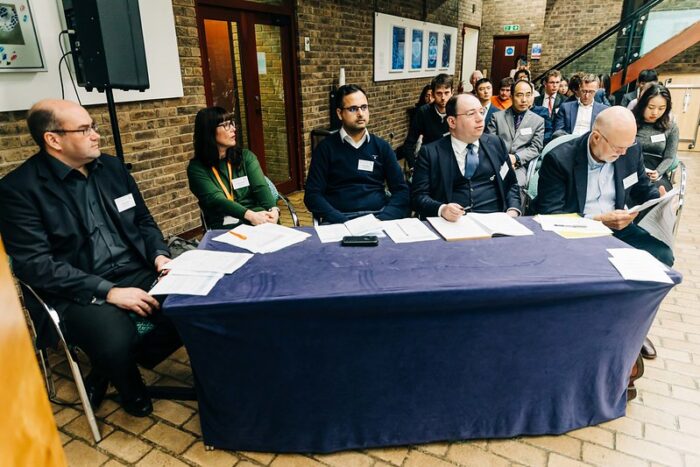The Churchill College Enterprise Competition aims to support the entrepreneurial skills of current students and alumni, developing leaders of the future. The programme offers training and development for all participants, regardless of whether they choose to enter a business idea for the competition or not.
In 2023, the Competition focused on finding business ideas or innovations linked to any area of the UN-SDGs, United Nations Sustainable Development Goals.
To support potential entrants, the programme included enterprise training, run with Cambridge Enterprise; workshops on the basics of starting a business, provided by current Churchill College Overseas Fellow Prof John Leichty; as well as networking and the opportunity to connect with mentors. Students and alumni who had ideas they wanted to take forward could then submit their entries for the competition, which culminated in a Grand Final pitching competition, followed by a networking dinner.
Eight teams were shortlisted for the Grand Final, which took place on March 25th to a packed room. Entrants were competing for a number of prizes, provided by a range of supporters.
The “best” team was to be awarded £2000 cash + £1000 value accounting support to get their venture up and running. “Best” was defined as the pitch the judges felt to be the most innovative, impactful and likely to succeed.
Additional £500 cash prizes were available for the team judged to have delivered the best pitch, and for the team which made best utilisation of team diversity.
The cash prizes were provided by Churchill College alumnus and start-up investor Malcolm Brinded (U71), while one year’s free accounting support was provided by Churchill alumnus Dimitrios Alafouzos (U98), a senior manager at Welland Orwell Chartered Accountants. Genvia, a joint venture between established engineering, construction and research organisations at the forefront of large-scale energy innovation, also sponsored the event.
After an impressive round of pitches, the judges made their deliberations. The judges included Alan Platt (U93), Churchill College alumnus and CEO of growing cyber-security firm Cyberhive; Caroline Hyde, Head of Ecosystem Initiatives and Partnerships at Cambridge Enterprise; Vik Chadha (U08), Churchill College alumnus and CFA charterholder. Malcolm Brinded, and Dimitrios Alafouzos were also on the panel, adding to the breadth of expertise.
The eight teams in contention included:
- Airmethods: autonomous drone battery change that can operate without human intervention. Idea from postgraduates Boyin Yang (Churchill College), Haysen Wang and Lewis Tang (Homerton College).
- Celluseal: an anti-counterfeiting nanocrystal film whose applications include protecting medication. Idea by postgraduates Nicky Wojtania and Emmanuela Bonglack (both Churchill College).
- Green Mint: a Blockchain-linked carbon offsets selling platform. Idea from Ching Man Wong and Takumi Sano (both Churchill College), and Xu (Leo) Jiang (Lucy Cavendish College).
- OREs: a central platform faciliting material re-use. Idea from undergraduates Edward Xu and Jeremias Pohle (both Churchill College).
- Lingua: an AI powered language learning app aiming to democratize access to quality language education. Idea by postgraduates Rao Ma, Jiaxuan Li and Jianing E (all Churchill College).
- Neurovolt: a wearable Near Infra-red Spectroscopy (NIRS) system and screening algorithm to detect early-stage dementia. Idea by undergraduates Sruthi Srinivasan (Churchill College) and Emilia Butters (Magdalene College)
- V2X App: a vehicles-to-everything app for drivers and cyclists. Idea by undergraduates Nils André (Churchill College) and Varun Latthe (Clare College).
- Go Tapa: a 3D printer optimised for rapid prototyping. Ideas by undergraduates Peadar Byrne and Chris Lotery (both Churchill College).
The winner of “Best Business Idea to Address a UN-SDG” was Celluseal. This business idea was from Nicky Wojtania (G22) studying for an MPhil in Biotechnology at Churchill College, and Emmanuela Bonglack, a Post-Doctoral By-Fellow at Churchill College. Nicky was unable to present on the day due to commitments racing in the women’s reserve ‘Blondie’ boat for the Oxford-Cambridge Boat Race (which she won), but Emmanuela pitched on behalf of them both.
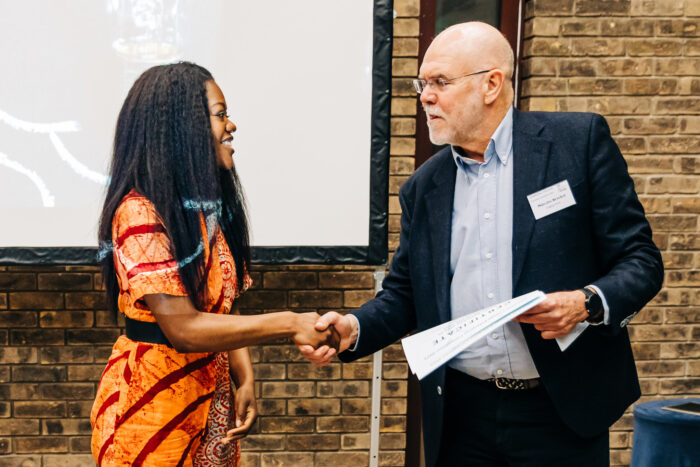
Commenting after the event, Nicky said, “The Churchill Enterprise Competition provided the perfect opportunity to refine our business idea. We left the competition having learned many lessons from understanding the key components of a good pitch, to sharpening the idea via mentorship from world-class entrepreneurs, and ending with thought-provoking questions from an impressive panel of judges. “
The winner of “Best Pitch” went to Go Tapa. This award recognised the persuasive nature of the pitch and the skills of the students in pitching. The business idea was from two Engineering undergraduates at Churchill College, Peadar Byrne and Chris Lotery.
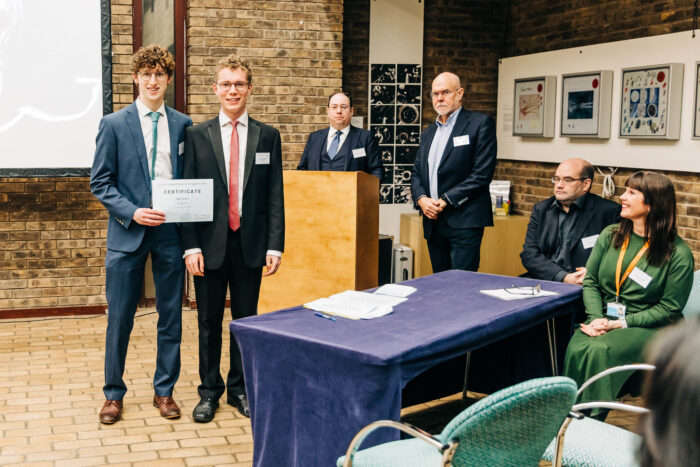
Chris and Peadar said, “The advice and guidance from our mentor taught us lots about the initial steps for taking a concept into a start-up. Preparing for and delivering a business pitch were very valuable experiences. We are very excited to build our first prototype from the £500 “best pitch” award. The networking at the pitching event connected us with people willing to advise on our future steps progressing to a start-up. This was an excellent opportunity, and I would highly recommend to anyone interested in start-ups to do it.”
The winner of “Best Utilisation of Team Diversity” went to Green Mint. This award recognised the application of a diversity of skills and inter-disciplinary working among the team. This idea was from three postgraduates: Ching Man Wong and Takumi Sano, both studying Business Administration, at Churchill College, and their associate Xu (Leo) Jiang, studying Digital Humanities at Lucy Cavendish College.
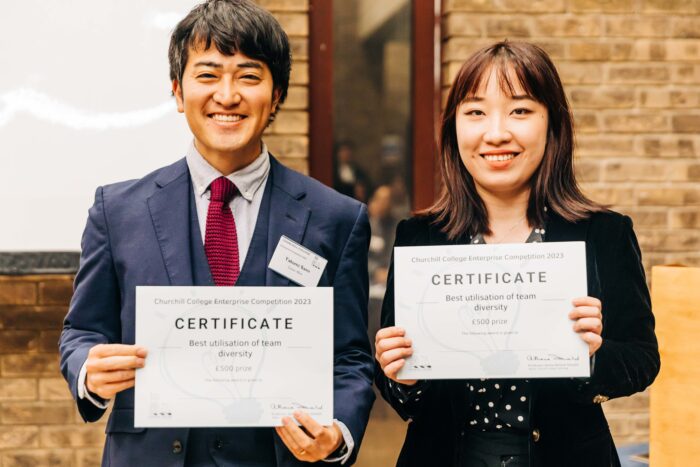
The team said, “We are deeply honoured to have been bestowed with this prestigious award for our commitment to diversity. Achieving this recognition was an immense undertaking that required diligent collaboration from every member of our team, leveraging their unique areas of expertise to elevate our efforts to the highest levels. The helpful feedback received from the esteemed mentor, as well as the knowledge gleaned from the friendly competition with other teams, were instrumental in our success. We are elated to use this invaluable experience as a catalyst to propel our entrepreneurial pursuits to even greater heights.”
All the judges agreed on the value of the event, with Malcolm Brinded saying afterwards:
“Well done Churchill College for running this excellent enterprise competition. Scientific research is of little consequence to humanity if not implemented; and that only comes through enterprises that develop, commercialise, and scale-up the best science and innovations. I look forward to seeing some of these aspiring Churchill entrepreneurs developing highly successful businesses!”
Vik Chadha added, “This was a great event hosted by Churchill College Cambridge which has been designed to encourage and support early stage entrepreneurs in the student and alumni community. The teams presented on a range of sustainable and topical ideas which are increasingly relevant in the complex global environment we face today.”
Dimitrios Alafouzos commented, “Supporting the entrepreneurial spirit of students is beneficial and motivating to them on one hand, most importantly, however, it underpins a wealth of opportunities for the country’s economic growth and prosperity in the medium and longer terms.”
Alan Platt said, “This event and others like it are helping to develop the next generation of entrepreneurs. By nurturing the wide range of talent in Cambridge, we help to keep the region at the leading edge of innovation. The teams who took part presented some great ideas. In particular it was great to see that the teams were focused on meeting real challenges that we face today including complex global environmental and social issues.”
Supporting this sentiment, Caroline Hyde noted, “Cambridge is the most successful innovation and technology cluster in the UK and Cambridge Enterprise is passionate about supporting our academic community to create impact from their research through entrepreneurship and innovation. The finalists displayed real innovation in addressing some of the big global challenges and we look forward to supporting them through their entrepreneurial journey.”
The evening concluded with networking and dinner. Rachel Thorley, the Community, Outreach and Recruitment in Engineering (CORE) Fellow, who organised the competition, said, “It was brilliant to see so many fantastic ideas and creative minds being applied to tackling real-world problems in practical ways. This is exactly what the Churchill College Enterprise Competition is all about, and I’m very grateful to everyone who has provided their support and time to make this happen.”
